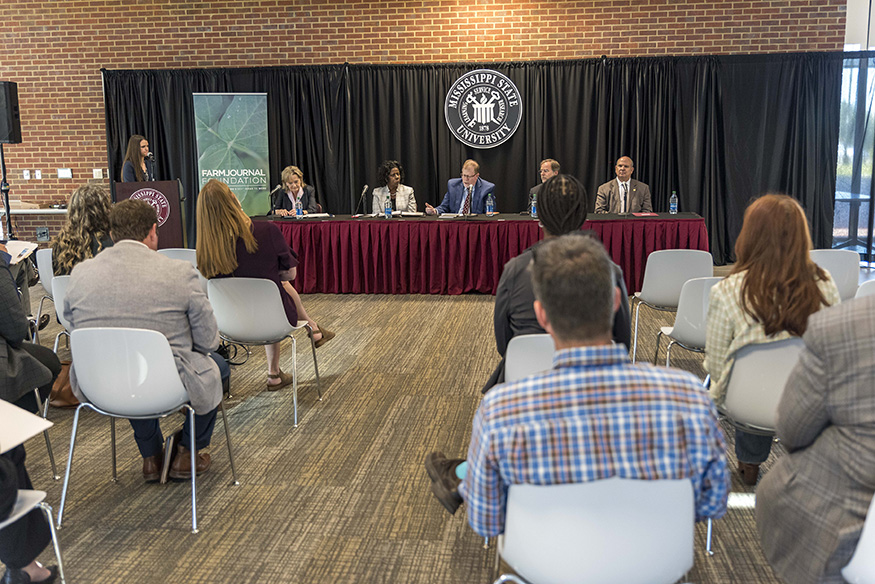Forum at MSU shows how agricultural innovation strengthens global food security

Contact: Mary Kathryn Kight
STARKVILLE, Miss.—U.S. Sen. Cindy Hyde-Smith recently met with agricultural scientists at Mississippi State University and industry leaders to discuss how public support for agricultural research and development (R&D) can help alleviate global hunger.
The event, which included a tour of MSU agricultural research facilities and a panel discussion, highlighted how innovations can strengthen food supply chains, prevent animal disease outbreaks and enable farmers to increase production with fewer resources. Today, the global food system is under significant pressure from challenges, including the conflict in Ukraine, the COVID-19 pandemic and extreme weather events. However, agricultural R&D can help make food systems more resilient, driving innovations to increase crop yields, preserve natural resources and enable farmers to adapt to different weather patterns.
“It’s more important than ever to put our heads together to come up with real solutions to avoid global food crises, particularly as our nation and the world continue to feel the effects of the crisis in Ukraine and a global pandemic. As challenges increase, so too must our investments in agriculture research and development. Mississippi State University and other stakeholders in our state already contribute to finding solutions to these problems, and we can do more,” said Hyde-Smith, who sits on the Senate Agriculture Committee. “I appreciate the Farm Journal Foundation and Mississippi State for facilitating this pertinent and valuable dialogue.”
Participants on the panel included Hyde-Smith; Keith Coble, vice president of the MSU Division of Agriculture, Forestry and Veterinary Medicine; Mike McCormick, Mississippi Farm Bureau president; Margaret Khaitsa, professor of veterinary epidemiology at the MSU College of Veterinary Medicine; and Mark Leggett, Mississippi Poultry Association president. Kelsey Barnes, the Farm Journal Foundation director of government affairs, served as the moderator. The event was organized and cohosted by MSU and the Farm Journal Foundation.
The tour included a stop at MSU's College of Veterinary Medicine, where Hyde-Smith and others learned about cutting-edge bovine respiratory research to address diseases that can be devastating for cattle farms. The tour also included stops at the university’s new livestock facility and its biophotonics research laboratory, which is funded by the U.S. Department of Agriculture’s Agricultural Research Service.
“Our scientists at Mississippi State are finding solutions to the challenges our farmers face to enhance crop production, protect aquaculture and livestock, and boost water resources here at home and in communities around the globe,” Coble said. “We are thankful for Sen. Hyde-Smith’s attention to this important topic and appreciate the opportunity to discuss agriculture research and extension funding. By working together, we are ensuring that global food security is a priority for years to come.”
Investing in agricultural R&D is increasingly important, as global hunger is at record levels and food insecurity remains a serious challenge nationally and in Mississippi. High food costs are also putting a strain on consumers both in the U.S and across the world. Agriculture is Mississippi’s most important industry, employing approximately 17% of the state’s workforce either directly or indirectly, according to the Mississippi Department of Agriculture and Commerce.
Agricultural research done in the public sector, including the work conducted at MSU, has an important role to play in strengthening global food security. While private sector research investments have had a significant impact, particularly on yields for large commodity crops such as corn and soybeans, the public sector can support early stage research to pave the way for significant long-term innovations. Public investment can also support comparatively under-explored areas, such as animal health, environmental and food safety research, and unlock innovations for smallholder farmers overseas, helping developing countries feed themselves.
Agricultural research has one of the highest returns of any public investment, returning on average $20 in benefits for every $1 invested. Yet today, China and Brazil now outspend the U.S. on public funding for agricultural research, threatening America’s competitive advantage in agriculture, according to a recent report commissioned by the Farm Journal Foundation and the American Farm Bureau Federation.
“Agricultural research and development create the tools needed for smallholder farmers to feed their local communities, so they are not dependent on U.S. food aid,” Barnes said. “It also makes our U.S. food system more resilient, creates opportunities for trade and ensures the world is more food secure. As the global food security crisis increases migration and conflict, it is in the best interest of U.S. national security to make long-term agriculture development investments to prevent future food insecurities and inflation.”